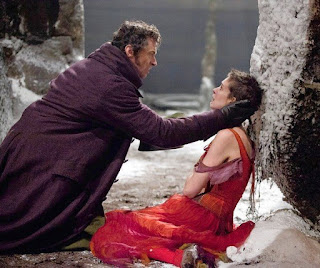REVIEW: LES MISERABLES
Before I go into detail about the powerhouse musical that is "Les Miserables" (referred to as "Les Mis" in this review, though throughout awards season I've heard it referred to as at least 5 other titles.), let me exclaim my bias for musicals, as I have worked on several of my high school's musicals along the way. At first guys never want to profess their interest for the movie musical, but after a "Grease" or "Sound of Music," their interests are usually turned for the best. The truth is, despite the macho stereotype, there are decent, non-Disney musicals out there on the market for an audience, and "Les Mis" happens to be one of them.
Well, I suppose you could go into a "Grease" or a "Seussical" with no prior musical background and still be pleasantly surprised. "Les Mis" is strictly for musical lovers, as it's not so much a musical as it is an opera (think "Jesus Christ Superstar," just about every sentence of dialogue in the film is sung with gleeful melodrama.) Aware of this fact as I walked in, the only other facts I was sure of was that it's been nominated for just about every award it's been eligible in this season, and that Anne Hathaway sang that song Susan Boyle wrote. Am I getting my facts, right? Really unless you are an actor (the ones I'm surrounded by were all thoroughly awaiting the release of this film) or a musical fan....well, I'd avoid this one. Outsiders will lament the film's running time, but it's actually about eight minutes shorter than "The Dark Knight Rises."

I'm not suggesting you don't feel the length after a certain amount of time. Jokingly discussing about buying the film's soundtrack, I developed an inquiry: how do you buy a soundtrack of a movie that's entirely songs? A three hour album of Hugh Jackman and Russell Crowe going back and forth? Surely impossible. But for those scanning this review in search of a mere explanation, I'll throw you a bone: Jean Valjean (Jackman) is finally released from prison, but his diabolical captor, Javert, sentences him to an almost worse fate; a life of parole. Perhaps this was most common in 18th century France, where the film takes place, spanning decades into the lives of those touched by Valjean's decisions. He does, in fact, break his parole, but has an epiphany moment (sung out in a powerhouse ballad, no less!) where he concludes God must have a good path for him, after he is treated to an act of kindness. He eventually becomes a mayor, and sees over a poor factory worker woman, played by Anne Hathaway.
All arrows point to Hathaway receiving her first Oscar, something that eluded her four years ago in "Rachel Getting Married," losing to Sandra Bullock. Her performance...it simply begs to be seen. In the film, Hooper favors close, intimate shots of the actor's face, something that can't be accessed in plays. He leaves the only instrument needed to display the horror, agony, and, you guessed it, the misery this woman has endured for her daughter. Hathaway's rendition of "I Dreamed a Dream" probably took many, many shots to capture such complex emotion, crying, pausing, begging for mercy...it all pays in what is by far the peak moment of this film, but a shame it is that it arrived so early on.
I single out Hathaway, but the ensemble's performances are all around Oscar worthy. Jackman, a revelation to see outside of his typical action genre, surely carries the film on his shoulders, slimmer shoulders, as it's been revealed he lost a significant amount of weight. His character is a constant balance of right vs. wrong, the wrong that has been inflicted onto him, and his character's desire to only improve the surroundings about him. You may have heard criticisms of Russell Crowe's singing voice, but I found it to be perfectly fine, and the chemistry he shares with Jackman as he endlessly searches to bring Jean Valjean to justice is electrifying. Crowe will be overshadowed by Jackman and Hathaway this awards season, but in years to come when "Les Mis" is in the ranks of future movie musical greats, his performance will be duly praised.
 Eddie Redmayne, Samantha Barks, and the genius comic duo of Helena Bonham Carter and Sacha Baron Cohen are all uniformly excellent, and they excel in servicing the musical's quirky characters, the latter two. While they provide a much needed comic relief to this exceedingly melancholy production, their bit goes on for much too long: we get it, they steal things. And, (and I can especially appreciate this because of long rehearsal hours) points go to the all around design of "Les Mis," a London town full of filth, grime and desolate buildings that fill out the mood Hooper was striving for. The costumes are immaculate as well, a fine cross between "Sweeney Todd" and "The King's Speech," Hooper's previous directorial effort.
Eddie Redmayne, Samantha Barks, and the genius comic duo of Helena Bonham Carter and Sacha Baron Cohen are all uniformly excellent, and they excel in servicing the musical's quirky characters, the latter two. While they provide a much needed comic relief to this exceedingly melancholy production, their bit goes on for much too long: we get it, they steal things. And, (and I can especially appreciate this because of long rehearsal hours) points go to the all around design of "Les Mis," a London town full of filth, grime and desolate buildings that fill out the mood Hooper was striving for. The costumes are immaculate as well, a fine cross between "Sweeney Todd" and "The King's Speech," Hooper's previous directorial effort.
And while this movie could come across as an obvious case of Oscar bait, the amount of blood, sweat and tears (lots of tears) evident in this picture shines too brightly, it triumphs as a passionate dream project only a director of expertise and ambition could accomplish. Yes, you will hear "Les Miserables" consistently butchered name announced many times on the award circuit, but take it as a sign of invitation rather than annoyance! While you may be only able to stomach it once, this film is a trip, a voyage even that must be experienced.
Rating: 3.5/4 stars
Well, I suppose you could go into a "Grease" or a "Seussical" with no prior musical background and still be pleasantly surprised. "Les Mis" is strictly for musical lovers, as it's not so much a musical as it is an opera (think "Jesus Christ Superstar," just about every sentence of dialogue in the film is sung with gleeful melodrama.) Aware of this fact as I walked in, the only other facts I was sure of was that it's been nominated for just about every award it's been eligible in this season, and that Anne Hathaway sang that song Susan Boyle wrote. Am I getting my facts, right? Really unless you are an actor (the ones I'm surrounded by were all thoroughly awaiting the release of this film) or a musical fan....well, I'd avoid this one. Outsiders will lament the film's running time, but it's actually about eight minutes shorter than "The Dark Knight Rises."

I'm not suggesting you don't feel the length after a certain amount of time. Jokingly discussing about buying the film's soundtrack, I developed an inquiry: how do you buy a soundtrack of a movie that's entirely songs? A three hour album of Hugh Jackman and Russell Crowe going back and forth? Surely impossible. But for those scanning this review in search of a mere explanation, I'll throw you a bone: Jean Valjean (Jackman) is finally released from prison, but his diabolical captor, Javert, sentences him to an almost worse fate; a life of parole. Perhaps this was most common in 18th century France, where the film takes place, spanning decades into the lives of those touched by Valjean's decisions. He does, in fact, break his parole, but has an epiphany moment (sung out in a powerhouse ballad, no less!) where he concludes God must have a good path for him, after he is treated to an act of kindness. He eventually becomes a mayor, and sees over a poor factory worker woman, played by Anne Hathaway.
All arrows point to Hathaway receiving her first Oscar, something that eluded her four years ago in "Rachel Getting Married," losing to Sandra Bullock. Her performance...it simply begs to be seen. In the film, Hooper favors close, intimate shots of the actor's face, something that can't be accessed in plays. He leaves the only instrument needed to display the horror, agony, and, you guessed it, the misery this woman has endured for her daughter. Hathaway's rendition of "I Dreamed a Dream" probably took many, many shots to capture such complex emotion, crying, pausing, begging for mercy...it all pays in what is by far the peak moment of this film, but a shame it is that it arrived so early on.
I single out Hathaway, but the ensemble's performances are all around Oscar worthy. Jackman, a revelation to see outside of his typical action genre, surely carries the film on his shoulders, slimmer shoulders, as it's been revealed he lost a significant amount of weight. His character is a constant balance of right vs. wrong, the wrong that has been inflicted onto him, and his character's desire to only improve the surroundings about him. You may have heard criticisms of Russell Crowe's singing voice, but I found it to be perfectly fine, and the chemistry he shares with Jackman as he endlessly searches to bring Jean Valjean to justice is electrifying. Crowe will be overshadowed by Jackman and Hathaway this awards season, but in years to come when "Les Mis" is in the ranks of future movie musical greats, his performance will be duly praised.
 Eddie Redmayne, Samantha Barks, and the genius comic duo of Helena Bonham Carter and Sacha Baron Cohen are all uniformly excellent, and they excel in servicing the musical's quirky characters, the latter two. While they provide a much needed comic relief to this exceedingly melancholy production, their bit goes on for much too long: we get it, they steal things. And, (and I can especially appreciate this because of long rehearsal hours) points go to the all around design of "Les Mis," a London town full of filth, grime and desolate buildings that fill out the mood Hooper was striving for. The costumes are immaculate as well, a fine cross between "Sweeney Todd" and "The King's Speech," Hooper's previous directorial effort.
Eddie Redmayne, Samantha Barks, and the genius comic duo of Helena Bonham Carter and Sacha Baron Cohen are all uniformly excellent, and they excel in servicing the musical's quirky characters, the latter two. While they provide a much needed comic relief to this exceedingly melancholy production, their bit goes on for much too long: we get it, they steal things. And, (and I can especially appreciate this because of long rehearsal hours) points go to the all around design of "Les Mis," a London town full of filth, grime and desolate buildings that fill out the mood Hooper was striving for. The costumes are immaculate as well, a fine cross between "Sweeney Todd" and "The King's Speech," Hooper's previous directorial effort.And while this movie could come across as an obvious case of Oscar bait, the amount of blood, sweat and tears (lots of tears) evident in this picture shines too brightly, it triumphs as a passionate dream project only a director of expertise and ambition could accomplish. Yes, you will hear "Les Miserables" consistently butchered name announced many times on the award circuit, but take it as a sign of invitation rather than annoyance! While you may be only able to stomach it once, this film is a trip, a voyage even that must be experienced.
Rating: 3.5/4 stars



Comments
Post a Comment